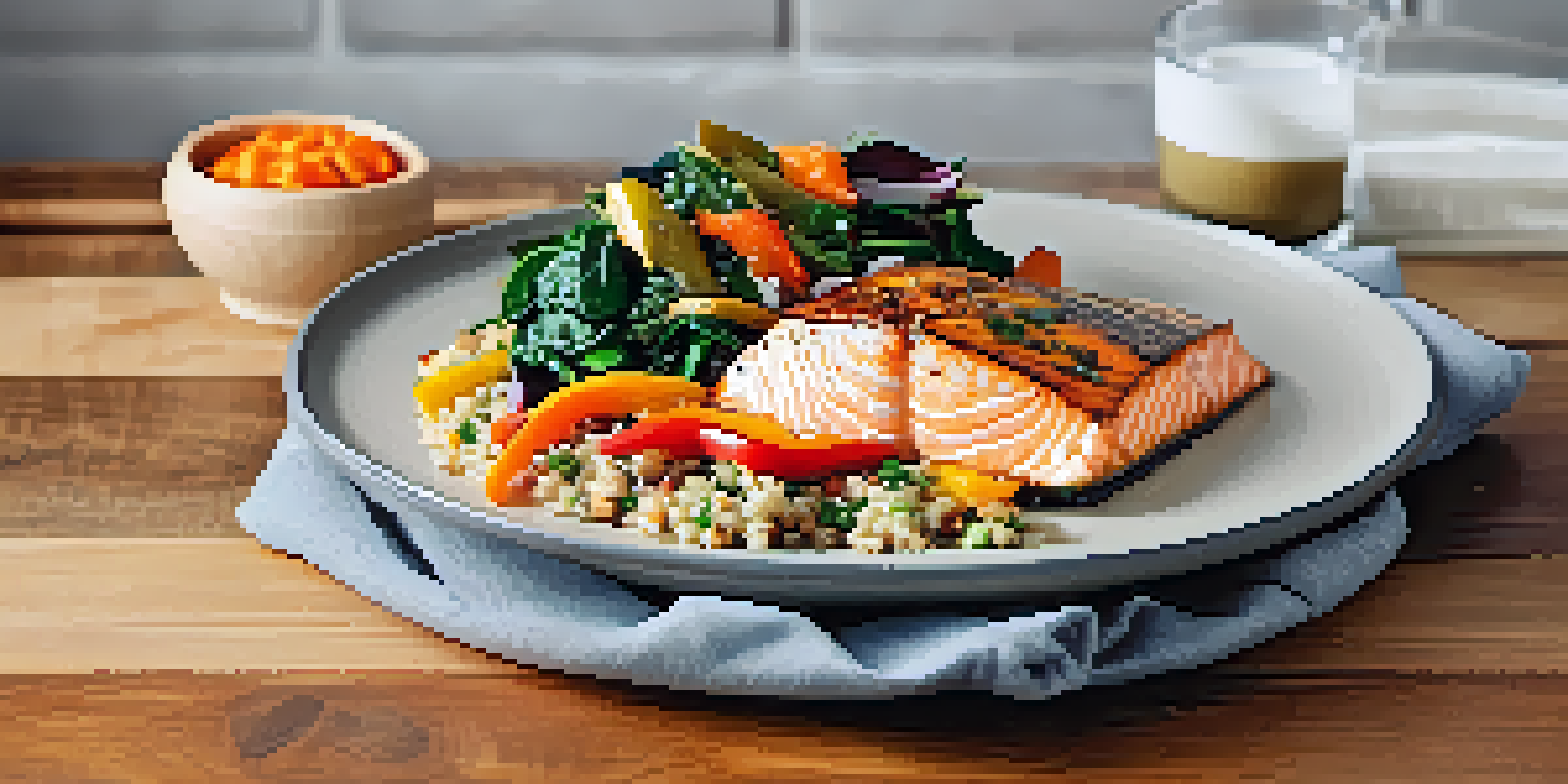How to Cook with Ingredients Known for Stress Relief Benefits

Understanding Stress and Food's Role in Relief
Stress is a common part of life, but what we eat can significantly influence how we feel. Foods rich in certain nutrients can help lower cortisol levels—the hormone responsible for stress. By choosing the right ingredients, we can create meals that not only nourish our bodies but also soothe our minds.
Let food be thy medicine and medicine be thy food.
Think of food as medicine; it can either exacerbate stress or alleviate it. For instance, magnesium-rich foods like leafy greens and nuts are known to promote relaxation. By incorporating these ingredients into our diets, we can foster a sense of calm amidst the chaos of daily life.
Additionally, the act of cooking itself can be a form of therapy. Engaging in the process can serve as a mindful distraction from stressors, allowing us to focus on preparing a delicious meal. This article will explore how to harness the power of cooking with stress-relief ingredients.
The Power of Omega-3 Fatty Acids for Stress Relief
Omega-3 fatty acids, found in fatty fish like salmon and walnuts, are celebrated for their ability to reduce anxiety and stress. These healthy fats help support brain function and can improve mood by boosting serotonin levels. Including these foods in your meals can be a delicious way to enhance your emotional well-being.

To incorporate more omega-3s, consider making a flavorful grilled salmon dish or tossing some walnuts into your morning oatmeal. You could even whip up a hearty walnut pesto to toss with pasta or spread on toast. The culinary options are endless!
Food Choices Affect Stress Levels
What we eat can significantly influence our stress levels, with certain nutrients helping to lower cortisol and promote relaxation.
By making omega-3-rich foods a staple in your diet, you're not just enjoying tasty meals, but also nurturing your mental health. It's a win-win situation, where every bite contributes to a calmer, more centered you.
Herbs and Spices That Promote Relaxation
Herbs and spices aren't just for flavor; many have been shown to possess stress-relieving properties. For example, chamomile is renowned for its calming effects, while turmeric boasts anti-inflammatory benefits that can help ease stress. Integrating these ingredients into your cooking can create a soothing atmosphere in your kitchen.
The food you eat can either be the safest and most powerful form of medicine or the slowest form of poison.
Imagine brewing a warm cup of chamomile tea after a hectic day or adding turmeric to your favorite curry for both taste and tranquility. These small adjustments can transform everyday meals into restorative experiences. Plus, experimenting with different herbs and spices can add exciting flavors to your dishes.
A sprinkle of cinnamon in your morning smoothie or a dash of ginger in your stir-fry can be the perfect way to boost your mood while enjoying a delicious meal. By embracing the power of herbs and spices, you can elevate your cooking while fostering a sense of calm.
Incorporating Dark Chocolate for a Sweet Mood Boost
Who said comfort food can't be healthy? Dark chocolate, in moderation, has been shown to lower stress hormones and improve mood. Rich in antioxidants, it offers a delightful way to indulge while benefiting your mental health. Incorporating dark chocolate into your diet can be a sweet strategy for stress management.
Consider adding dark chocolate to your breakfast by drizzling it over oatmeal or blending it into a smoothie. You can also use it as a base for a rich, creamy sauce to pair with berries in a dessert. The key is to enjoy it mindfully, savoring each bite for its taste and mood-lifting properties.
Omega-3s Boost Mood and Calm
Incorporating omega-3 fatty acids from sources like salmon and walnuts can enhance emotional well-being and reduce anxiety.
Remember, it's not just about the chocolate itself but how it makes you feel. The joy of cooking and indulging in a dark chocolate treat can create moments of happiness in your day.
The Role of Whole Grains in Stress Management
Whole grains like brown rice, quinoa, and oats are more than just hearty staples; they play a crucial role in stabilizing mood and reducing stress. Their high fiber content helps regulate blood sugar levels, preventing the energy crashes that can lead to irritability. By opting for whole grains, you're making a smart choice for both your body and mind.
Think about a comforting bowl of oatmeal topped with berries and nuts for breakfast, or a quinoa salad loaded with colorful vegetables for lunch. These meals are not only nourishing and satisfying, but they also support a balanced mood throughout the day.
Including whole grains in your daily meals can create a foundation for a healthier lifestyle, one that prioritizes both physical and emotional well-being. It's about making the right choices that contribute to a calmer, more centered you.
Fruits and Vegetables That Boost Mood
Fruits and vegetables are not just essential for a balanced diet; they also play a key role in promoting mental well-being. For instance, berries are packed with antioxidants that help combat stress, while leafy greens provide vital nutrients that support brain health. The colors and textures of fresh produce can even uplift your mood just by looking at them.
Try incorporating a variety of colorful fruits and veggies into your meals—think vibrant salads, smoothies, or stir-fries. Each bite offers a chance to boost your mood and nourish your body. Plus, the natural sweetness of fruits can satisfy cravings without compromising health.
Fermented Foods Support Mental Health
Fermented foods such as yogurt and kimchi improve gut health, which is linked to reduced anxiety and better mood.
Embracing a rainbow of produce in your diet is a delightful way to enhance your meals while caring for your mental health. It's a simple yet effective strategy to cultivate a happier, healthier lifestyle.
The Benefits of Fermented Foods for Stress Relief
Fermented foods like yogurt, kimchi, and sauerkraut are known for their gut health benefits, which in turn can influence mental health. A healthy gut microbiome is linked to reduced anxiety and improved mood. By including these foods in your diet, you're not only supporting digestion but also nurturing your mental well-being.
Consider adding a dollop of yogurt to your breakfast or enjoying a side of kimchi with your dinner. These foods add a tangy flavor to your meals while providing beneficial probiotics that can help balance your gut flora. The connection between gut health and stress relief makes these ingredients a must-have in your pantry.

Incorporating fermented foods can be an enjoyable culinary adventure, allowing you to explore new flavors while caring for your body and mind. It's about finding the right balance that suits your taste buds and supports your overall health.
Creating Stress-Relief Meals: Recipes to Try
With all these incredible ingredients in mind, let's put them together into stress-relief meals. Think about a nourishing bowl of quinoa with roasted vegetables, topped with grilled salmon and a drizzle of tahini sauce. This dish combines omega-3s, whole grains, and a variety of colorful veggies for a deliciously calming experience.
Another great option could be a comforting dark chocolate chia pudding that not only satisfies your sweet tooth but also provides nutrients that support mental health. Top it with fresh berries for added antioxidants and flavor. It's a delightful way to enjoy dessert while promoting relaxation.
The key to creating these meals is to experiment and find combinations that you love. Cooking with stress-relief ingredients can be both fun and rewarding, leading to a culinary journey that nourishes your body and calms your mind.